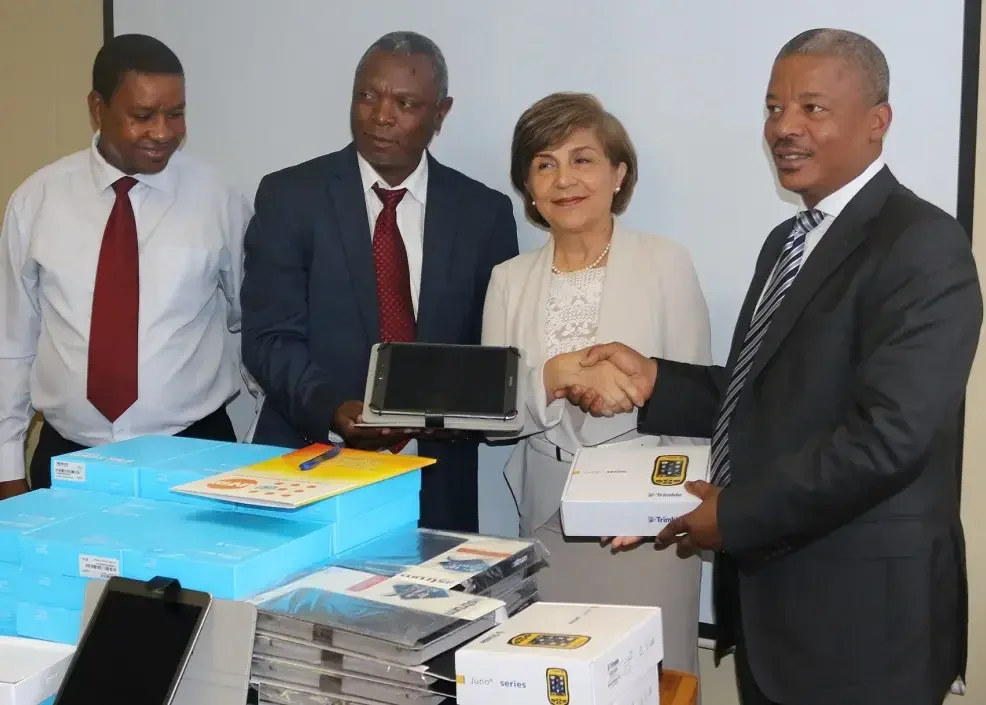
Sister Lindiwe Shongwe preparing for resuscitation after delivering a baby ©UNFPA 2018
Lindiwe Shongwe is from Sdvwashini, a township in the outskirts of Mbabane, in the Kingdom of Eswatini. Lindiwe is a practicing midwife for more than 10 years at the Mbabane Government Hospital. She has recently been promoted to be the Sister in Charge of the maternity department.
“I was attracted to midwifery because I love babies. I realized I have a passion for midwifery and I love midwifery “explains Lindiwe on how she fell in love with the midwifery profession.
Being a midwife means caring for pregnant women, women who are in labor and after delivery. When one is a midwife, they need to be competent, so that they are able to diagnose when there are complications or even when the labor process is abnormal, you should be able to detect these conditions and take appropriate actions in a timely manner.
While most of us fear the pain that women in labour endure, that is not the case for Lindiwe. Her journey as a midwife brings nothing but fulfillment to her heart as she explains that her greatest joy is that she is the first person to come in contact with a pregnant woman, especially at the labor ward. “You are the first person who comes in contact with this woman in labour, you are the first person to cuddle this new-born baby. You hold the baby and you bring the baby to the mother’s abdomen and the joy you see when this woman is holding her baby is very fulfilling. Nothing brings me greater pleasure than to correctly detect and manage a patient especially when there are complications, I enjoy resuscitation to save a life.”
“Sometimes being a midwife can be challenging”, she narrates. For instance, there are times when you educate the woman on how to cope with the process of labor, especially when assigned at the labor ward. But once the labor pain starts, the woman will behave directly the opposite of what you had taught them. So when you are a competent midwife, you need to try by all means to exercise emotional intelligence by controlling your emotions, so that you are able to help the woman deliver a normal, healthy bouncing baby.
“Of course we encounter situations where you deliver a baby with severe congenital abnormalities, who is severely asphyxiated or distressed, even when you try to resuscitate, the baby will eventually die. Sometimes you can conduct the delivery and the baby is still-born, but having to tell the woman on the outcome of the delivery, is very heart breaking, it’s losing a life at the end of the day. All these count as the hardest and bad memories of being a midwife leading to sleepless nights”.
“Of course there are beautiful memories in the maternity ward. Creating relationships and friendships with pregnant women and their families is heartwarming. Sometimes when they see you in town they show you pictures of their baby you helped deliver, some of these babies are adults now. Some will approach you just to appreciate the quality of care that you rendered at the maternity ward, which is very encouraging and motivating for me”.
“I think the greatest challenge for mothers is the delay of acquiring transport to go to the nearest health facility ending up delivering on their way . There may be some complications, you may find that they bleed a lot and some products of conception will be retained. So by the time she reaches the hospital, it is already late or the condition has complicated.”
“Sometimes midwives experience challenges on the correct detection and management of the patient and that is another delay that we encounter in our facilities. Sometimes we have a shortage of medicines and supplies. You may know what you have to do for the patient but because there are no medicines and supplies at times, we encounter delays, trying to out-source the life-saving medicines and supplies from other departments. Another challenge we face is human resource and yet our clients increase day by day. For instance, if there are only two midwives in a shift, and a number of clients with different needs, that is monitoring clients and admission of new clients, which at the end of the day results in poor monitoring of the patients they are not able to correctly detect some problems that could have been diagnosed prior”,she said.
Lindiwe further encouraged people who are passionate about midwifery to join the profession. They should be ready to care for two people and be competent to apply their skills and knowledge according to the expected standards. Sometimes as a midwife, you need to be able to work under pressure or else you might lose your temper. You need to be able to control your emotions. The ability to act during emergency situations and work as a team requires moving fast and swiftly to be able to save lives, both of mother and baby.
“Looking at our Triennial reports on maternal deaths, most of them are preventable. So investments in obstetrics means strengthening capacity of midwives to provide quality care to work proficiently, with the desired knowledge and skills. This can enable midwives to timely detect and manage maternal and neonatal conditions so that we can reduce morbidity and mortality”.
“UNFPA and other partners support us with refresher training courses to improve our skills and competencies. In maternal deaths UNFPA also assists in auditing these deaths where we able to identify gaps that need to be addressed so that we can improve on the management of those cases. Onsite trainings are also important for efficiency of service provision”.
“In midwifery we work as a team, in my department, I would like our data to talk to us, we have quarterly review meetings on our data which has helped us identify some gaps and come up with a comprehensive plan. We want to try and improve our data reviews, make them shorter so that we are able to promptly address the challenges that we identify. Another thing would be to continue mentoring our newly deployed midwifes to ensure that they continue to excel in the work that they do”.




